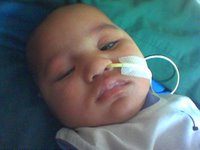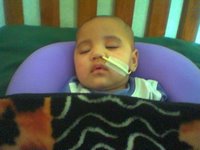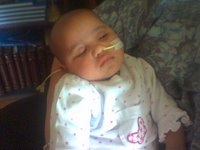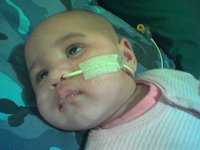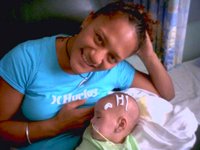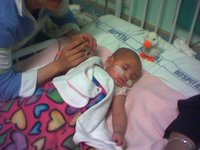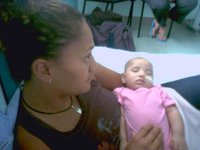This from Kataraina's mum:
"Baby has been having infantile spasms, and the doctors said it's not good because they are causing her pain. They have upped her Vigabatrin, and if that doesn't work, they will try Diazepam (valium). If that doesn't work, they will have to give her steroids, and the side-effects aren't nice. She has an EEG tomorrow, and her meds are being monitored for 48 hours. If they give her steroids, it could be up to two weeks before they know if it's working."
So that's the latest from the hospital. The following info is from the National Institute of Neurological Disorders and Stroke:
What are Infantile Spasms?
Infantile spasm (IS) is a specific type of seizure seen in an epilepsy syndrome of infancy and early childhood known as West Syndrome. The onset is predominantly in the first year of life, typically between 3-6 months. The typical pattern of IS is a sudden bending forward and stiffening of the body, arms, and legs; although there can also be arching of the torso. Spasms tend to begin soon after arousal from sleep. Individual spasms typically last for 1 to 5 seconds and occur in clusters, ranging from 2 to 100 spasms at a time. Infants may have dozens of clusters and several hundred spasms per day. Infantile spasms usually stop by age 5, but are often replaced by other seizure types. West Syndrome is characterized by infantile spasms, hypsarrhythmia (abnormal, chaotic brain wave patterns), and mental retardation. Other neurological disorders, such as cerebral palsy, may be seen in 30-50% of those with IS.
Is there any treatment?
Treatment with corticosteroids such as ACTH (adrenocorticotrophic hormone) and prednisone is standard, despite the risk of serious side effects. Newer antiepileptic medications, such as vigabatrin (currently not approved for use in the US) have shown some efficacy. A small minority of children has secondarily generalized spasms as the result of cortical lesions (areas of damaged brain tissue). Removal of these lesions may result in improvement.
What is the prognosis?
The prognosis for children with IS is dependent on the underlying causes of the seizures. The intellectual prognosis for children with IS is generally poor because many babies with IS have neurological impairment prior to the onset of spasms. Spasms usually resolve with or without treatment by mid-childhood, but more than half of the children with IS will develop other types of seizures. There appears to be a close relationship between IS and Lennox-Gastaut Syndrome, an epileptic disorder of later childhood.
What research is being done?
The NINDS supports broad and varied programs of research on epilepsy and other seizure disorders. This research is aimed at discovering new ways to prevent, diagnose, and treat these disorders and, ultimately, to find cures for them. Hopefully, more effective and safer treatments, such as neuroprotective agents, will be developed to treat IS and West Syndrome.


